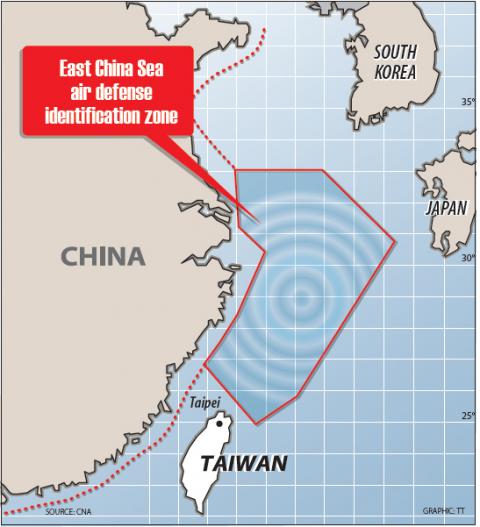Expressing regret that Beijing issued a map earlier in the day of an East China Sea air defense identification zone that includes the disputed Diaoyutai Islands (釣魚台), the Taiwanese government yesterday called on all parties involved to remain calm in dealing with the issue to avoid an escalation of regional tensions.
The islands, known as the Senkaku Islands in Japan, are also claimed by Taiwan and Japan.
China’s ministry of Defense issued a statement on its Web site yesterday regarding the establishment of the zone.

The statement was accompanied by a map and a set of rules regarding the zone, which stated that all aircraft must notify Chinese authorities and are subject to emergency military measures if they do not identify themselves or do not comply with orders from Beijing.
It did not elaborate on the punitive measures, but said the rules went into effect yesterday.
In response, Ministry of National Defense spokesman Major General David Lo (羅紹和) expressed regret over China’s move and said the military would take measures to protect national security and sovereignty in accordance with relevant regulations and rules.
Later yesterday, the National Security Council issued a statement which referred to the East China Sea peace initiative promoted by President Ma Ying-jeou (馬英九) in August last year and called on all parties to show restraint, shelve disputes and work together to develop the resources in the waters around the Diaoyutai Islands through joint efforts.
Commenting on the matter, Democratic Progressive Party Legislator Hsiao Bi-khim (蕭美琴), who sits on the Foreign Affairs and National Defense Committee, called on China not to incite regional tension.
Chinese Nationalist Party (KMT) Legislator Lin Yu-fang (林郁方), who also sits on the legislature’s Foreign Affairs and National Defense Committee, suggested that China’s move was aimed at Japan, as China did not include Taiwan’s Pengjia Islet (彭佳嶼) in its East China Sea air defense identification zone.
Li Fung, a Hong Kong-based Chinese military expert, said that China’s move can be regarded as an effort to bolster Beijing’s sovereignty claims over the islands.
It also showed the Chinese government is preparing for military conflict with Japan over the disputed islands, Li said.
Tensions between China and Japan have escalated after Japan purchased three of the five Senkaku Islands from their private owners in September last year and nationalized them.
This move was seen as undermining a tacit agreement between China and Japan, Li said.
Japan has also taken a similar measure by creating a military identification zone over the disputed islands, Li added.
Since then, China has sent regular coast guard patrols to the islands, which are 200km northeast of Taiwan and 400km west of Japan’s Okinawa.

CHAOS: Iranians took to the streets playing celebratory music after reports of Khamenei’s death on Saturday, while mourners also gathered in Tehran yesterday Iranian Supreme Leader Ayatollah Ali Khamenei was killed in a major attack on Iran launched by Israel and the US, throwing the future of the Islamic republic into doubt and raising the risk of regional instability. Iranian state television and the state-run IRNA news agency announced the 86-year-old’s death early yesterday. US President Donald Trump said it gave Iranians their “greatest chance” to “take back” their country. The announcements came after a joint US and Israeli aerial bombardment that targeted Iranian military and governmental sites. Trump said the “heavy and pinpoint bombing” would continue through the week or as long

TRUST: The KMT said it respected the US’ timing and considerations, and hoped it would continue to honor its commitments to helping Taiwan bolster its defenses and deterrence US President Donald Trump is delaying a multibillion-dollar arms sale to Taiwan to ensure his visit to Beijing is successful, a New York Times report said. The weapons sales package has stalled in the US Department of State, the report said, citing US officials it did not identify. The White House has told agencies not to push forward ahead of Trump’s meeting with Chinese President Xi Jinping (習近平), it said. The two last month held a phone call to discuss trade and geopolitical flashpoints ahead of the summit. Xi raised the Taiwan issue and urged the US to handle arms sales to

State-run CPC Corp, Taiwan (CPC, 台灣中油) yesterday said that it had confirmed on Saturday night with its liquefied natural gas (LNG) and crude oil suppliers that shipments are proceeding as scheduled and that domestic supplies remain unaffected. The CPC yesterday announced the gasoline and diesel prices will rise by NT$0.2 and NT$0.4 per liter, respectively, starting Monday, citing Middle East tensions and blizzards in the eastern United States. CPC also iterated it has been reducing the proportion of crude oil imports from the Middle East and diversifying its supply sources in the past few years in response to geopolitical risks, expanding

An Emirates flight from Dubai arrived at Taiwan Taoyuan International Airport yesterday afternoon, the first service of the airline since the US and Israel launched strikes against Iran on Saturday. Flight EK366 took off from the United Arab Emirates (UAE) at 3:51am yesterday and landed at 4:02pm before taxiing to the airport’s D6 gate at Terminal 2 at 4:08pm, data from the airport and FlightAware, a global flight tracking site, showed. Of the 501 passengers on the flight, 275 were Taiwanese, including 96 group tour travelers, the data showed. Tourism Administration Deputy Director-General Huang He-ting (黃荷婷) greeted Taiwanese passengers at the airport and